
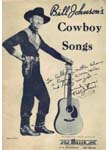


|
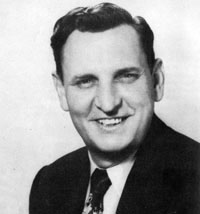 |
|||||||||||||||||||||||||||||
|
About The Artist Clyde Leonard Moody had significant achievements in three forms of country music. First as an old-time musician in Wade Mainer's Sons of the Mountaineers including the Happy-Go-Lucky Boys and as an emerging bluegrass musician in work with Bill Monroe in the early 1940's. Finally from 1945, Clyde was an early pioneer in the post World War II more modern forms of country music, popularized by such better-known vocalists as Eddy Arnold. In his years as a solo vocalist, he became best known for his original song "Shenandoah Waltz." Clyde was born in Cherokee North Carolina, the eleventh in a family of twelve. The family farmed, work was hard, life was hard and his father was stern. Some did play music and sing. About 1928 they moved to Marion, North Carolina. In a 1984 interview with Sandy Neese, he said he started picking the guitar when he was nine years old. Clyde told the Tennessean columnist, "My dad played claw hammer banjo, and I had an older brother who played banjo and another who played fiddle. They'd play for corn-shuckings and such. I friend of ours had a 12-string Stellar guitar and I watched him play all the time. One night I asked if I could take it home with me, and I picked it up and started playing right away. The Lord gave me the knowledge and the gift." At fourteen Clyde left home, hoping to become a musician. His father told him not to bother to come back. Speaking of that incident, Clyde gave the Sandy Neese some details and background. His dad, who was half-Cherokee Indian ruled the family with an iron hand. "He didn't tell you anything twice." ... "When I got ready to leave home he told me, "There's the road and it has two ends, and you'll never make no money with that guitar." I said, "If I can't, I won't be back to bother you." His dad then said, "That's fine, now get gone." Clyde found work in a logging camp for a while until he met Jay Hugh Hall (brother of the better known Roy) about 1933. They found a time spot and landed a quarter-hour daily program at WSPA in Spartanburg, South Carolina. They called themselves, the Happy-Go-Lucky Boys, a name they would continue to use after they became—with the addition of Steve Ledford—part of Wade Mainer's Sons of the Mountaineers in the fall of 1937. The Mainer group recorded extensively for Bluebird shifting their radio base from such spots as WIS Columbia, WPTF Raleigh, and WWNC Asheville. In 1939, he helped J. E. Mainer on a session. In February 1940 they did a session without Wade as the Happy-Go-Lucky Boys. Soon after, Clyde parted company with the Mainers, but soon found a new job.
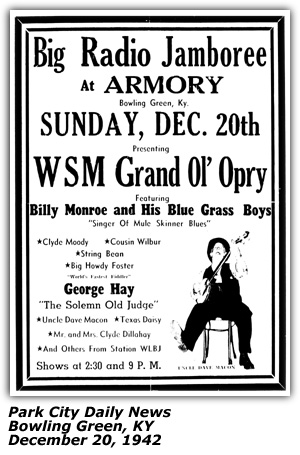 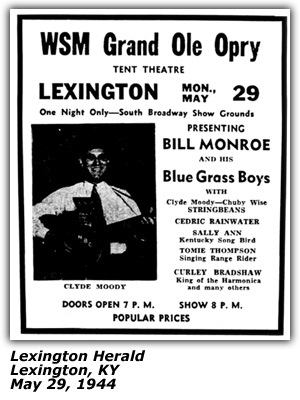 Moody soon joined forces with Bill Monroe as guitarist and lead singer in the chorus with the Blue Grass Boys. He played the first show on September 6, 1940, and then headed for Nashville to appear on the Grand Ole Opry the following night. While Bill and the Blue Grass Boys weren't quite playing what would become bluegrass, they were transitioning in that direction. A month later, he did his first session as a Blue Grass Boy. He remained with the band-except for short breaks-until early 1945. Bill and his group recorded a tune written by Clyde called "Six White Horses." (Note: This is not the tune that Tommy Cash had a hit with in 1969.) Clyde's obituary noted that "the sideman" originated what became known as the "two finger" or "climbing the stairs" style of guitar picking in bluegrass music while he was with Monroe. He was, however, absent from the 1941 Bluebird session as he had temporarily reformed the Happy-Go-Lucky Boys with Lester Flatt as a new member. During the Monroe phase of the Moody career, his baseball skills came in handy as a pitcher on the Blue Grass Boys baseball squad. Clyde left Monroe when he signed a contract with Columbia as a solo artist in February which resulted in four songs, only two released. Meanwhile, he continued to work solo on the Opry. In 1946, Moody cut a pair of singles for the independent Bullet Records, one song "If I Had My Life to Live Over" that became one of his best known numbers. Clyde Moody's recording career took a turn for the better when he began with the new King label in February 1947. His first release, the original "Shenandoah Waltz," turned out to be a major hit and his signature song. He remained with King through 1952, doing fifty solo numbers and six additional numbers as part of the sacred quartet, Brown's Ferry Four. Shenandoah Waltz Norm Rowe, columnist for the Richmond Times-Dispatch shed some light as to the origins and popularity of the song, "Shenandoah Waltz" in a column in October 1951. He started his essay this way, "Virginia's beautiful Shenandoah Valley was the inspiration for a North Carolinian to write the lyrics of a tune which Yankee music men now are grooming to compete with the over-rated waltz product of Tennessee."
In 1951, the song came back to life on the pop charts. Tommy Tucker, an orchestra leader, did a recording of the song for the MGM (10897) label. Mr. Rowe wrote but did not credit what was written in the BMI Record Report in the February 10, 1951 issue of The Billboard: "...a terrific follow-up of "Tennessee Waltz" ... tune is slated for heavy promotion ... other labels are covering this sure bet." Indeed, others were recording the tune: The Dinning Sisters, Eddie Zack, Baron Elliot Octet with vocals by Jimmy Confer, Frankie Yankovic, Bucky Tibbs and Jimmie Dale, Lulu Belle and Scotty, Lawrence Welk, Richard Hayes, Sammy Kaye, Charlie Monroe and His Kentucky Partners. The song was recorded by numerous folks over the years. Mr. Rowe tells how Clyde and a group of entertainers were on tour in Virginia. One day, he happened to hear the fiddler in his band, Chubby Wise, play a tune that "...made music to the Moody ears." Clyde asked Chubby, "What was that?" Chubby just said, "Oh, something I dreamt up." Clyde told him, "Let's put the music on paper and I'll write the lyrics for it." And the story goes it only took him all of 12 minutes. Mr. Rowe then told his readers: "And now some four years later when New York's Tin Pan Alley has to find a quick sequel for a Hit Parader, a Virginia inspiration gets the call to become a potential hit item on the national music scene."
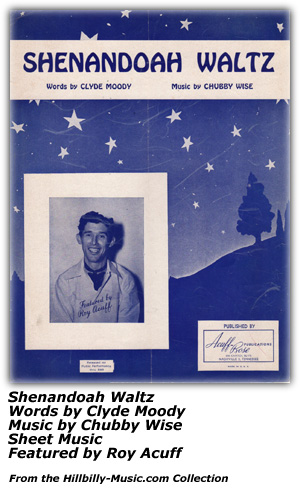 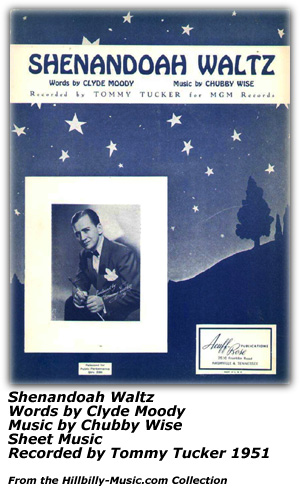 Many of his secular songs were in waltz time: "Carolina Waltz,: "Waltz of the Wind," "West Virginia Waltz", "Cherokee Waltz," etc., which gave him the name as "the Hillbilly Waltz King." He remained with the Opry through 1948 when he went to WARL in Arlington, Virginia to work for Connie B. Gay in his shows in the Washington, DC area for eighteen months. One of the concerts at Constitution Hall on April 24, 1948 drew a crowd of over 5,000 people. On the program were such stars as CLyde Moody, Hawkshaw Hawkins, Pete Cassel and Hank Penny. Connie B. Gay handled the emcee chores. The show was also broadcast over WWDC, a local 250 watt radio station.
When he went to WDVA in Danville, VA, the station began the "WDVA Virginia Barn Dance." Those type of shows were popular in Virginia. Richmond had a couple of versions of its own Old Dominion Barn Dance with Sunshine Sue's leadership lasting over a decade. It spawned the competing Atlantic Barn Dance. The show rapidly gained popularity and notice. It became part of the Saturday night rotation over the Mutual Broadcasting System of barn dance shows in February 1953. The network would broadcast a half-hour at 8:30 pm on Saturday nights. The Richmond show was the fist in the rotation. Hillbilly Music was in the news around that time. There was a campaign to declare the birthday of Jimmie Rodgers "National Hillbilly Music Day" in 1953. Sunshine Sue even tried to convince a congressman over the airwaves during her broadcast one Saturday night. Billboard featured the station in a November 26, 1955 article. The show took place at the Great Danville Fair at an exhibition hall that was turned over on Saturday nights to the station for the show. Admission was $1.00 for adults and kids were free with adults. The station splits revenue with the Fair. WDVA also provided all the publicity, advertising and labor for the barn dance show. Talent costs were taken off the gross before any division of the revenue. The Billboard article implied the Fair would get about $2,000 from each show. In a March 1984 interview he recalls when he made the decision to do televised 30-minute shows for Connie B. Gay from Constitution Hall. It was to be over the Dumont Network. He noted there was no CBS, NBC or ABC networks as there are today. Television was still in its infant stages of growth. Clyde said, "The TV screens were only six inches wide. I weighed 215 and took the whole screen up." In the mid-1980's, he did an appearance with his old boss, Bill Monroe. Clyde said they did two shows. Clyde said he got a five minute standing ovation and even children were standing and applauding. Monroe told Clyde, "Well, guess the old man's still got it."
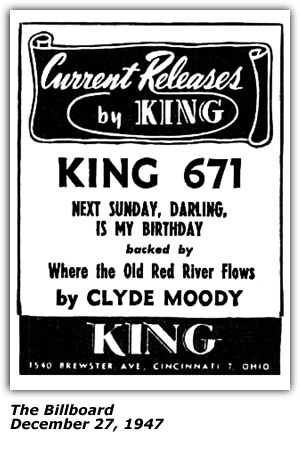 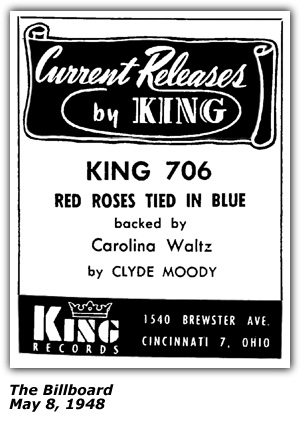
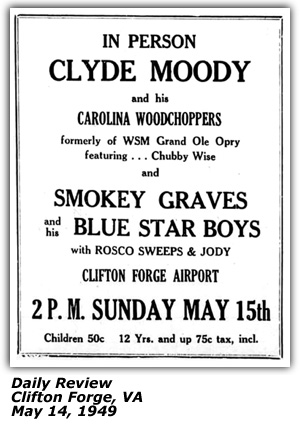 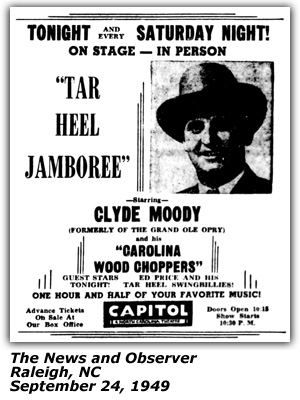
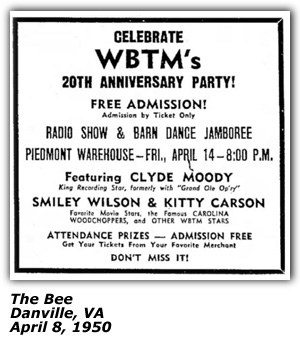 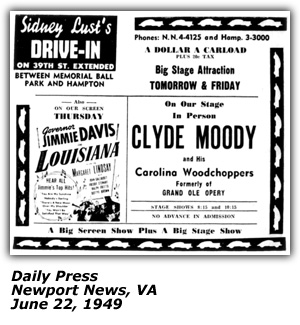 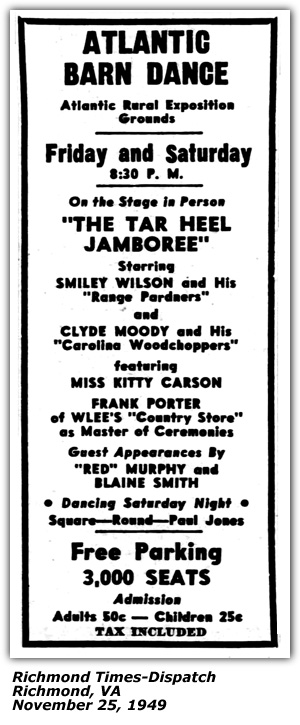 Clyde Moody extended his musical career for the better part of the next four decades although his days as a major figure were pretty much over. After leaving Connie B. Gay, he worked for a time on WDBJ Roanoke and at WDVA as headliner of the Virginia Barn Dance. He signed with Decca that released only three singles in about as many years. Clyde concluded that they signed him to prevent him from competing with such artists as Red Foley and others who moved toward a "country crooner" style, which he himself as a solo artist had pioneered.
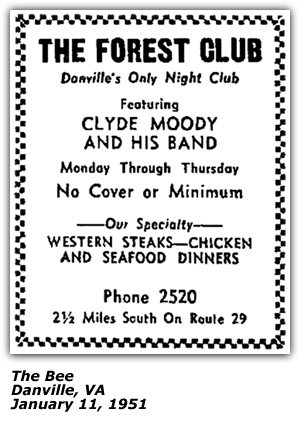 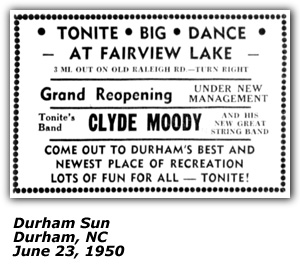
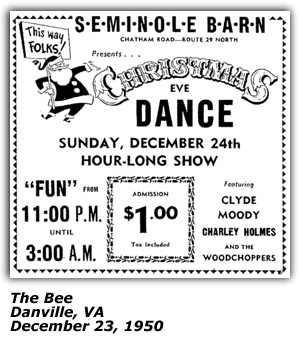 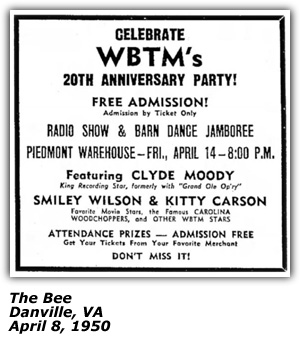
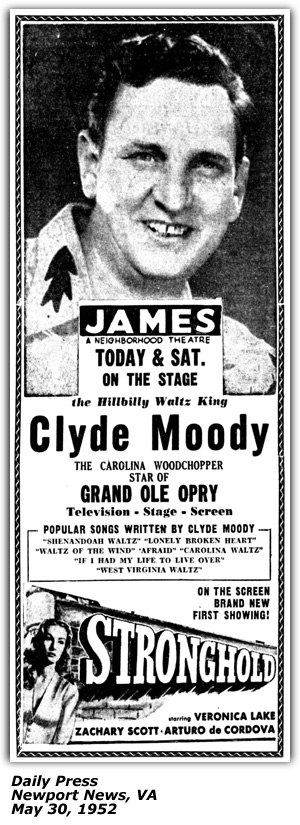 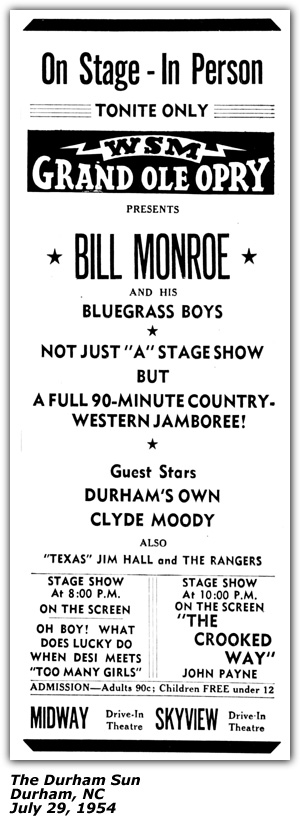
The Later Years
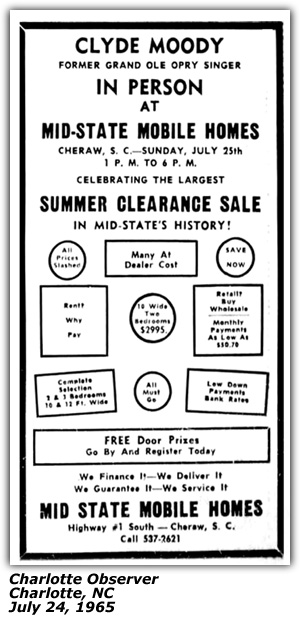 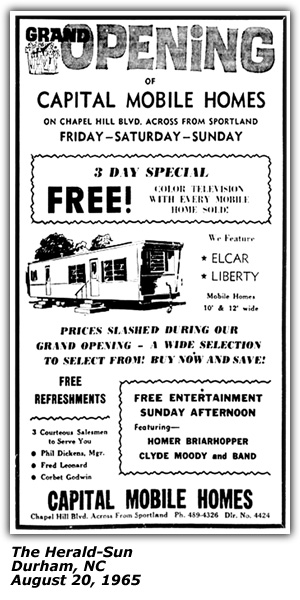 For a while (ca. 1957-1963), he left music entering the mobile home business but then returned to his first love. In 1963, Cash Box reported that Starday had signed Clyde to the label. His first release was "Nobody's Business" b/w "Waltzing In The Arms Of A Friend." He returned to Nashville and made an album for Starday, Songs that Made Him Famous (SLP 262), but that and three singles failed to restore the old fame. A Wango album of old time songs White House Blues (LP 102) with only his guitar was well received and appreciated by the few who heard it. Prior to 1971, he had a morning TV program Carolina in the Morning in Raleigh. Recording waltz songs in 1965 for Aubrey Mayhew's Little Darlin' resulted in a pair of singles and a belated (by 20 years) album on Longhorn All Time Country and Western Waltzes (LH 2004) also made little impact.
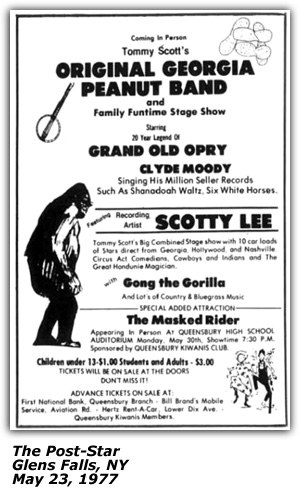 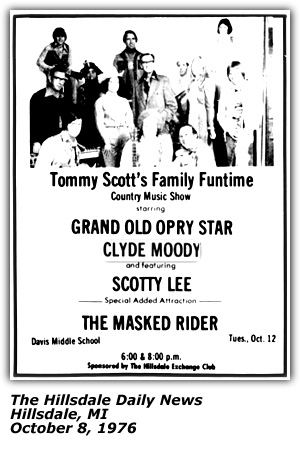
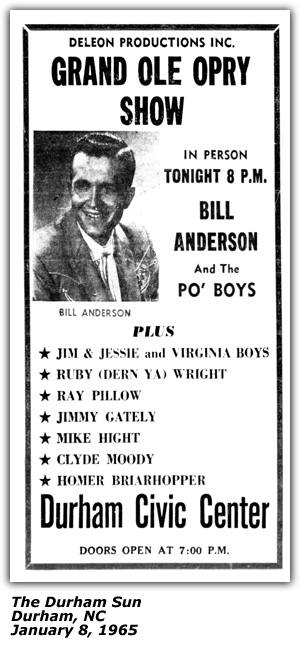 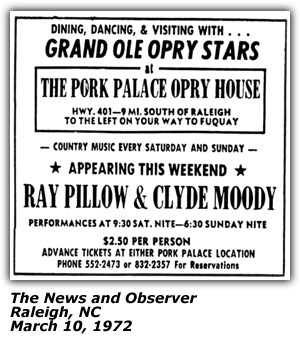 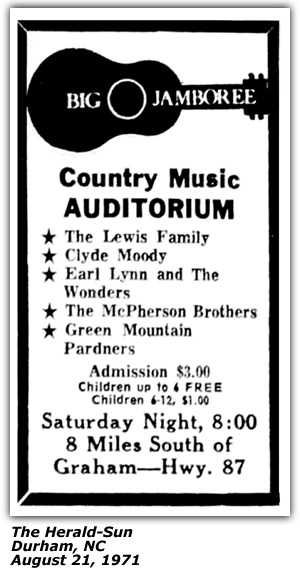 One of the old Carolina musicians Tommy Scott had survived near obscurity with semi-Medicine Show and Clyde worked with him for a season or two, turning out albums on Gusto and Old Homestead (ca. 1978-1980). In the 1980's several interviews of Clyde were found in various newspapers, including the wire services such as Associated Press. In 1984, at the age of 69 he embarked on another chapter of his recording career. His friend since the 1940's, Aubrey Mayhew, signed him to his Black Rose Records label. Clyde told Sandy Neese of the Tennessean, "Aubrey's been a friend of mine since the early 1940's, and I told him, I've done about all I can do. I think I'll quit." But Aubrey told him, "No, you're not through yet." His first release on the label was a tune Mayhew wrote, "California Dreams." The song was on The Cash Box "Top 100 Country Singles" chart for eight weeks, peaking at number 64 on March 31, 1984. Clyde wrote the flip side, "While My Heart Is Breaking." He also touched upon his observations of the new generation of singers versus the days when he first started. "These kids nowadays, they've got a gravy train with biscuit wheels. We were like blind hogs in a meat house. There were no interstates, no gas stations. It was the worst thing I ever saw to run out of gas." Speaking of running out of gas, he remembered, "One time when (I) was picking with Bill Monroe, (Bill and I) had to push to push our vehicle over nine miles to reach our hotel. I weighed 215 and Bill weighed 230, so it wasn't no problem for us to push that thing. We'd push uphill and ride downhill." In an interview with Joe Edwards in June of 1984, he brought up another difference between the musical generations of performers. He told Mr. Edwards he felt the big concert fees of 1984 reflected a spirit of greed. He said his era was one of occasional 'lonely pockets.' Clyde said, "Lots of times I didn't collect (accept) anything, on a bad day or something. I'd say to the promoter, "Catch you on the next 'round." His appearances in the early days were not the 15,000 seat arenas of the modern era. He said people would come to his shows with their mules and they'd use lanterns for lights. "Lots of times you'd play in a school auditorium; you'd get 200 if you were lucky, and sometimes the crowd would spill out into the school yard. It would cost them 10 or 15 cents each. He became known as the "Waltz King." Joe Edwards quoted Clyde, "Three-quarter music has always been a favorite of mine. Any place on earth, when you come to three-quarter music, the (dance) floor fills up." In the middle of the 1940's when country music was thriving, he turned some heads in the country music industry and even lost favor with some. He added a trumpet and a piano to his act. In that era, those instruments were not considered to be a part of a 'genuine country music sound.' But Clyde explained to Mr. Edwards, "I wanted a country song with a Glenn Miller sound. Some people said I'd lost my mind." In addition to recording with Mayhew, Clyde got his friend to work with him on an organization called the "Pioneer Association." Its goal was to preserve the memories of those "...stalwarts of country music whose contributions might otherwise be lost." Clyde said, "So many people today don't know these people or care. They should be remembered." He told Dennis Sellers in 1985, some history of Vernon Dalhart having the first million selling single, of Red Foley who he considered the 'greatest narrator of song' and that Eddy Arnold would have been forgotten if he wasn't worth $80 million. He felt some artists weren't remembered until after their death. He said while the Country Music Pioneers Association wanted to keep the memories of those early greats alive, "...it isn't fair to shun the noteworthy individuals while they are alive. Give me my roses while I live, is what I say." He went on in that 1984 interview: "I've played and sang [sic] with everybody who was anybody, and a lot who never became somebody, and I remember it all like it was yesterday," he said with a smile. From 1972, Clyde made three solo albums for Old Homestead, one bluegrass, one country, and one sacred (on which yours truly did liner notes), and managed to survive until declining health claimed him at age 74. Foreign firms such as Bronco Buster and BACM have kept many of his recordings available on compact disc. While he may have had his opinions about country music and may be considered a traditionalist, it did not mean he could lend a hand to folks when needed. One such opportunity was to help the Sheriff of Cheatham Country buy a computer to facilitate stolen property recovery in September 1984. The sheriff, Dorris Weakley, got Clyde Moody, Benny Martin and several local groups to provide the entertainment for a catfish meal fund raiser. Part of the reason for the computer was that to enter stolen property in the NCIC (National Crime Information Center) computer database they needed to have a record of serial numbers. The information could allow officers to look up items very quickly once such information was entered for a search. Until then, deputies would go through stacks of paper to match up stolen and recovered items. The computer (in 1984) was to cost about $5,000. The Sheriff's department hoped to raise the funds by selling about 1,000 tickets for the event. A dinner of catfish with all the trimmings would cost adults $5.00 and children $3.00.
He was known for wearing a white cowboy hat. He told Joe Edwards it had an inscription inside, "Like hell it's yours — put it back." Clyde passed away in Nashville's Memorial Hospital in April 1984. Upon his passing it was noted that Colonel Tom Parker, Elvis Presley's manager, paired him up with Clyde for a six week tour in 1955 to help Elvis get some exposure and meet people. Moody recalled in 1984, "He was a nice kid." A wire service story reporting Clyde's passing noted that Aubrey Mayhew said Clyde was actually performing the night he went into the hospital to treat complications from an aortic aneurysm that required surgery several weeks prior, but he never seemed to recover from. It was said that Aubrey published all of Moody's more than 120 compositions and had produced his records for over 20 years. Reportedly he had worn out 21 Cadillacs during his travels to appearances throughout the South. Clyde had first married Janie Parker on November 14, 1932 in McDowell County, North Carolina. However, research shows that Janie and their four year-old son, Jimmie, died in a house fire on May 20, 1947 in their wood frame home just east of Gastonia that was near the Priscilla Mill. Another son, Alonzo was home at the time and was rescued by a neighbor; he was said to have been found near the bed where the rescuer also saw the younger boy and Mrs. Moody. She could not go back to the room a second time to get the other two. The Gastonia Fire Department indicated an exploding lamp as the cause of the fire. Research indicates that the other children of Janie and Clyde were Bobbie Lee (b. 1933); Martha Eloise (b. 1935); Betty (b. 1935); Alonzo (b. 1937); and, Peggy Ann (b. 1945). Clyde Moody was reported to have been living in Nashville at the time of the fire. When Clyde arrived for a personal appearance in Gastonia to benefit the Gastonia Youth Center on May 29, 1947, he told reporters that he and Janie were divorced in 1940 and he had remarried. He later married the former Frances Stephenson on April 12, 1941 in Williamson County, Tennessee. It would appear that Clyde became a widow a second time. Frances died at Rex Hospital in Raleigh, NC after a long illness on February 1, 1968 per her obituary. One of her obituaries indicated she was survived by two daughters, Susan Lynne and Debra Jo Moody. He was survived by his wife, Eletha (they married on March 27, 1969). While the Find-A-Grave web site shows Eletha's name on Clyde's grave site, she later remarried and is buried elsewhere.
"I've never gone anyplace where I couldn't go back. I never mistreated anyone." — From a 1984 Associated Press interview.
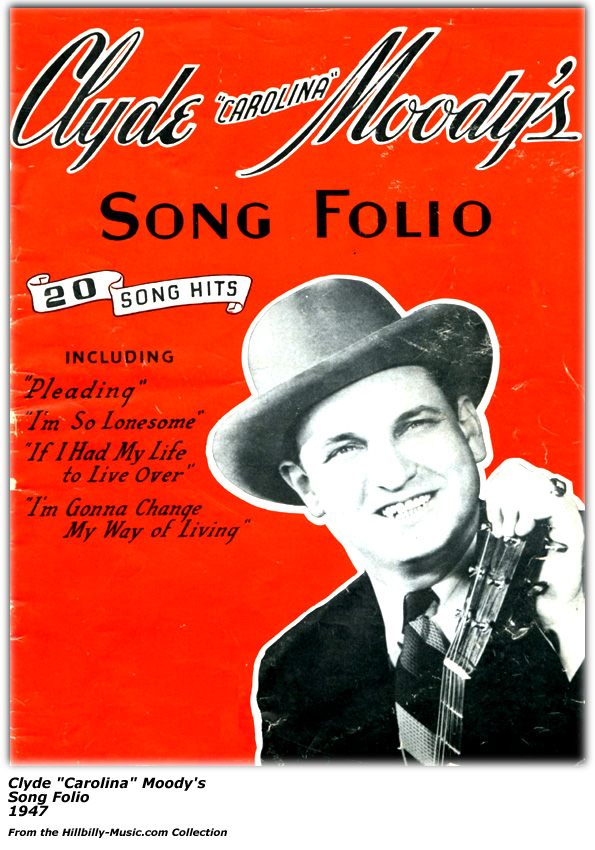
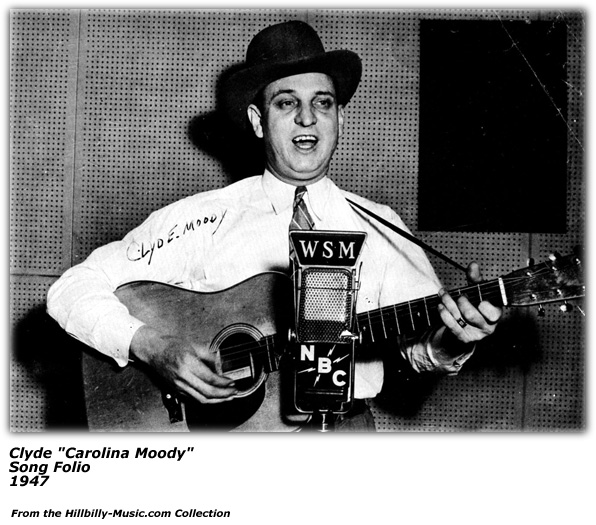
Credits & Sources
Get The Music
|
|||||||||||||||||||||||||||||||||||||||||||||||||||||||||||||
| Printer Friendly Version |
|
Recordings (78rpm/45rpm)
| |||||||||||||||||||||||||||||||||||||||||||||||||||||||||||||||||||||||||||||||||||||||||||||||||||||||||||||||||||||||||||||||||||||||||||||||||||||||||||||||||||||||||||||||||||||||||||||||||||||||||||||||||||||||||||||||||||||||||||||||||||||||||||||||||||||||||||||||||||||||||||||||||||||||||||||||||||||||||||||||||||||||||||||||||||||||||
Hillbilly-Music.com
Yes, Hillbilly Music. You may perhaps wonder why. You may even snicker. But trust us, soon your feet will start tappin' and before you know it, you'll be comin' back for more...Hillbilly Music.
Hillbilly-music.com ...
It's about the people, the music, the history.
|
Copyright © 2000—2023 Hillbilly-Music.com
|
||||